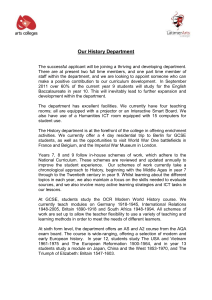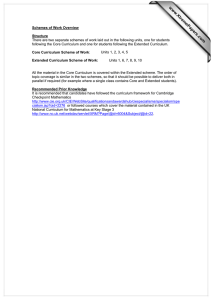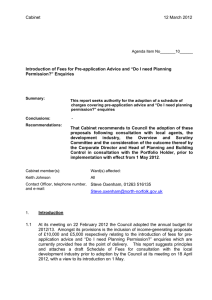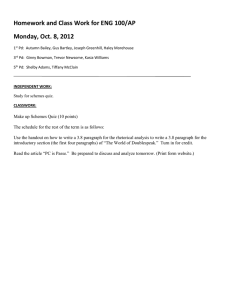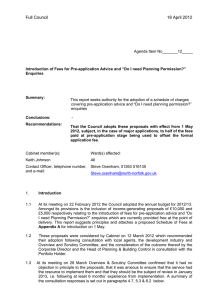PLANNING PROTOCOL FOR NORTH NORFOLK DISTRICT COUNCIL DEVELOPMENTS
advertisement
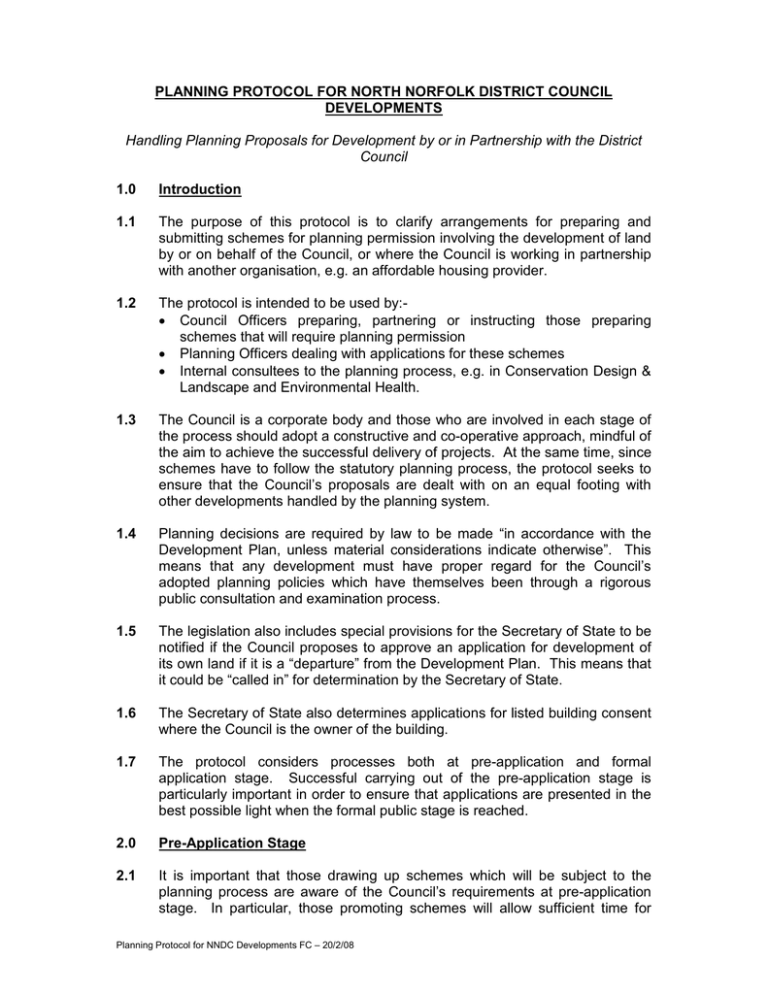
PLANNING PROTOCOL FOR NORTH NORFOLK DISTRICT COUNCIL DEVELOPMENTS Handling Planning Proposals for Development by or in Partnership with the District Council 1.0 Introduction 1.1 The purpose of this protocol is to clarify arrangements for preparing and submitting schemes for planning permission involving the development of land by or on behalf of the Council, or where the Council is working in partnership with another organisation, e.g. an affordable housing provider. 1.2 The protocol is intended to be used by:• Council Officers preparing, partnering or instructing those preparing schemes that will require planning permission • Planning Officers dealing with applications for these schemes • Internal consultees to the planning process, e.g. in Conservation Design & Landscape and Environmental Health. 1.3 The Council is a corporate body and those who are involved in each stage of the process should adopt a constructive and co-operative approach, mindful of the aim to achieve the successful delivery of projects. At the same time, since schemes have to follow the statutory planning process, the protocol seeks to ensure that the Council’s proposals are dealt with on an equal footing with other developments handled by the planning system. 1.4 Planning decisions are required by law to be made “in accordance with the Development Plan, unless material considerations indicate otherwise”. This means that any development must have proper regard for the Council’s adopted planning policies which have themselves been through a rigorous public consultation and examination process. 1.5 The legislation also includes special provisions for the Secretary of State to be notified if the Council proposes to approve an application for development of its own land if it is a “departure” from the Development Plan. This means that it could be “called in” for determination by the Secretary of State. 1.6 The Secretary of State also determines applications for listed building consent where the Council is the owner of the building. 1.7 The protocol considers processes both at pre-application and formal application stage. Successful carrying out of the pre-application stage is particularly important in order to ensure that applications are presented in the best possible light when the formal public stage is reached. 2.0 Pre-Application Stage 2.1 It is important that those drawing up schemes which will be subject to the planning process are aware of the Council’s requirements at pre-application stage. In particular, those promoting schemes will allow sufficient time for Planning Protocol for NNDC Developments FC – 20/2/08 processes to be properly conducted at the pre-application stage. Promoters of schemes are strongly advised to contact Planning Officers to establish requirements before proceeding to formal application stage. 2.2 Major Schemes For major schemes developers are expected to carry out a number of steps as set out in the planning pages of the Council’s website and in particular under the section ‘Have your say - major planning proposals’. The planning advice note covering this topic explains the requirements for major developments, which the note defines. It also makes it clear that developers of a scheme should contact planning officers who will provide pre-application advice on development proposals and undertake technical consultation with relevant internal and external consultees as well as advising on the pre-application public consultation which will be required. At least six weeks should be allowed for these processes to be undertaken. 2.3 Other Schemes On more minor schemes pre-application consultation with planning officers should also take place, with at least four working weeks to be allowed for this process and at least six weeks if consultation is necessary with technical consultees. Planning officers will give advice on the technical requirements which need to be met in submitting an application. As a result of legislative changes in 2006, these will almost always include a Design and Access Statement and may also include Assessments covering flood risk, contaminated land, traffic and wildlife surveys. 2.4 All Schemes – Project Initiation Report (PIR) Initial contact should be made via the relevant Development Control Managers, or Head of Planning in their absence. At this stage a short Project Initiation Report should be supplied to the Development Control Manager, outlining the purpose of the project, the background, including any relevant Minute, the proposed timescale and the extent of the site. A copy of the Report should also be forwarded to the Communications Manager, so that any media issues can be addressed, following discussion with the officer who submitted the Report prior to any media contact or media response being made. 2.5 Planning officers and internal consultees will adopt a positive approach to proposals wherever possible. In the event of the scheme raising significant objections for internal consultees, they will seek the views of their manager before responding to the planning consultation. If there is a serious policy objection to a proposal this matter will be brought to the attention of the Head of Planning and Building Control or the Development Control Manager who will discuss the matter with the officer who submitted the PIR before a formal response is given. 2.6 Other sources of advice are available on the Planning Applications part of the website, including downloadable application forms, application guidance notes, guides to filling in the application form and fees and Design and Access Statements guidance notes. Planning Protocol for NNDC Developments FC – 20/2/08 3.0 Formal Applications 3.1 Every effort will be made to deal with applications within the statutory time scales (13 weeks for major applications and 8 weeks for other types). As at the pre-application stage, in the event of the scheme raising significant objections for internal consultees, they will seek the views of their manager before responding to the consultation on the planning application. 3.2 Sometimes consultation responses give rise to significant difficulties which might mean that the Planning Officer would have to recommend refusal of the application or the imposition of onerous conditions on a permission. In these cases the Planning Officer will alert the Development Control Manager or Head of Planning and Building Control, who will discuss this with the officer who submitted the PIR and will offer the applicant or agent the opportunity to negotiate amendments or withdraw the application. 4.0 Committee Consideration If an application is reported to Committee, District Councillors will be reminded that they are required to treat the application as with any private proposal. However, there is no right of appeal against a refusal of an application for the Council and in these cases the Committee will give the applicant an opportunity to amend or withdraw the scheme prior to a final determination. Planning Protocol for NNDC Developments FC – 20/2/08
